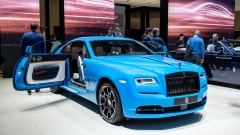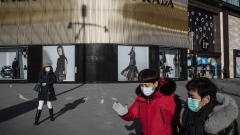Jul 24, 2020
'Like it's an aquarium': Music industry faces uphill climb in return to live shows
, BNN Bloomberg
Horseshoe Tavern's plan for reopening as Toronto is held back from stage 3
The live music industry faces a difficult question as communities embark on the slow path to economic re-opening: How do you re-create the communal concert experience in an era of social distancing?
One of Toronto’s top club promoters is waiting it out, at least for the time-being.
“The [maximum allowable indoor capacity] is at 50 right now and you need plexiglas across the stage,” Collective Concerts owner Jeff Cohen told BNN Bloomberg in an interview on July 17. “I think we're going to wait it out a couple of weeks. That number is too small for us to operate.”
Cohen, whose company owns the venerable Toronto venues Lee’s Palace and the Horseshoe Tavern said the fan experience isn’t where it needs to be with the restrictions imposed as part of the province’s COVID-19 recovery efforts. Toronto is one of only three regions in Ontario currently in Stage Two of the province’s economic re-opening plan.
“Think about it. How do you feel about watching a live band plexiglased in, like it's an aquarium?” he asked.
The Horseshoe Tavern, which has operated in Toronto for more than 70 years routinely hosts Canadian bands like The Joel Plaskett Emergency and The Lowest of the Low, but has in the past seen legendary acts like Willie Nelson, The Strokes, The Tragically Hip and even The Rolling Stones grace its stage.
The road to recreating the live experience will be a tricky one, according to another music industry figure.
“I think you’ll see concert promoters try to passively re-enter the marketplace with smaller test-market venues, be them outside or spacially-distanced venues that make great sense,” Bell Media director of podcasting and artist and music industry relations, and former Universal Music Canada vice-president, Tyson Parker told BNN Bloomberg in a phone interview.
Parker applauds promoters like Cohen for heeding public safety, even as their business model gets “rocked.” However, any new model will take some adjustment from die hard concert-goers, he added.
“It’s a bit of a contradiction to why we all love rock and roll: Because it’s dangerous,” Parker said.
“It’s nice to saddle up to a bar and try to get yourself another beer and walk back up to the stage through a crowd and see Wilco hammering out a song. It’s exciting and it’s dangerous. A pandemic version of that is going to be less exciting, quite rightly.”
One lifeline for acts to find a live audience has been the advent of the drive-in concert. Emerging early in the pandemic as a concert option for those who can physically distance while being entertained, the phenomenon hit Ontario on July 1 with a Markham, Ont. concert by Canadian country singer Dean Brody.
Toronto’s City View Drive-In began a summer concert series on July 17, located on the grounds of the Rebel night club and with performances by the likes of July Talk and A Tribe Called Red. Other such concerts are taking place across the U.S. and Canada.
Another new wrinkle that has emerged during the pandemic that poses a threat to the live music business model is live-streamed performances which offer greater intimacy and access afforded to fans than a typical concert.
“I think people will pay for what they want, and it’s up to the artists who understand what it is that their fanbases want and delivering it in a professional, high-end, but affordable delivery model,” Parker said.
“I like that. It’s almost sort of a fan-club approach to the business model … you have access and I think the pandemic has kind of brought that ethos back into the business model of bands and artists.”
His comments dovetail with those of Torquil Campbell, co-lead singer of the Montreal band Stars, who told BNN Bloomberg in April that the pandemic would spell the end of the existing live music model and force bands to get better in touch with the physical community around them.
Cohen agrees that a smaller focus is in the offing from live acts.
“I think they've been shell shocked by this,” Cohen said of the caliber of band that frequently rolls through his clubs. “They're not into going into a van and leaving their residence.”
That said, he sees the eventual return of the concert industry as a boon to venues like the 400-person-capacity Horseshoe Tavern.
“I'm not worried that people aren't going to come back,” he said. “A lot bigger bands are going to play smaller venues like the Horseshoe real soon.”
BNN Bloomberg is a division of Bell Media, which is owned by BCE.





